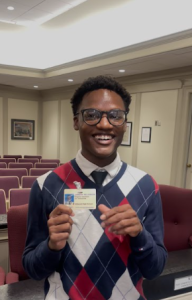Heteronormativity
May 23, 2017
(A true story)
There I sat, waiting for the play to begin. I was on a field trip to see a performance of Hamlet, a
play which unbeknownst to me would become one of my favorites. And while the play itself is a
storytelling marvel, it was the events that would transpire at the performance that established
the fallen prince’s firm place in my heart.
I looked around anxiously, as I usually do at an event like this, anticipating the moment when
the lights would dim and the curtains open and I would be transported into Shakespeare’s
masterpiece. People of all types flooded the theater. Elderly women embellished in fine jewels,
accompanied by husbands in equally lavish dress, juxtaposed against my fellow eighth grade
students in nice but certainly less flashy attire.
Then I saw him.
Time seemed to slow as he emerged through the large double doors, calmly swaggering his
way towards the row of seats our class occupied. He was a fellow classmate, yes; I had seen
him in orchestra many times but never in this light. His pale skin glistened under the faint glow
of theater lights, his black hair falling perfectly around his ears, framing his equally beautiful
face. Freckles dotted his cheeks, forming constellations across an entrancing sky.
As he sat, a barrage of thoughts entered my mind. As a fifteen year old boy, thoughts like these
only entered my mind when I looked at my girlfriend at the time, and the fact that I could feel this
way about another boy confused and intrigued me. I tried to take my mind off these thoughts,
but as the lights dimmed and the curtains closed, the only masterpiece I could think of was the
one seated five seats away from me.
I sat revelling in my confusion, unaware of the passage of time. Then I heard Hamlet proclaim
his famous soliloquy, one that would follow me forever:
“To be, or not to be– that is the question:Whether ’tis nobler in the mind to suffer
The slings and arrows of outrageous fortune
or to take arms against a sea of troubles
And by opposing end them. To die, to sleep– no more– and by a sleep to say we end
The heartache, and the thousand natural shocks that flesh is heir to. ‘Tis a consummation
devoutly to be wished. To die, to sleep– to sleep– perchance to dream: ay, there’s the rub, for in
that sleep of death what dreams may come when we have shuffled off this mortal coil, must give
us pause.”
And though death may have ended the thousand shocks my flesh was to inherit at that moment,
I did not need sleep to have miraculous dreams. My mind and heart agreed to accept my
feelings. And though I know he may never feel the same way even after I have shuffled off my
mortal coil, my dreams and life have benefited from the experience. Love is universal, and
gender can not restrict it.










